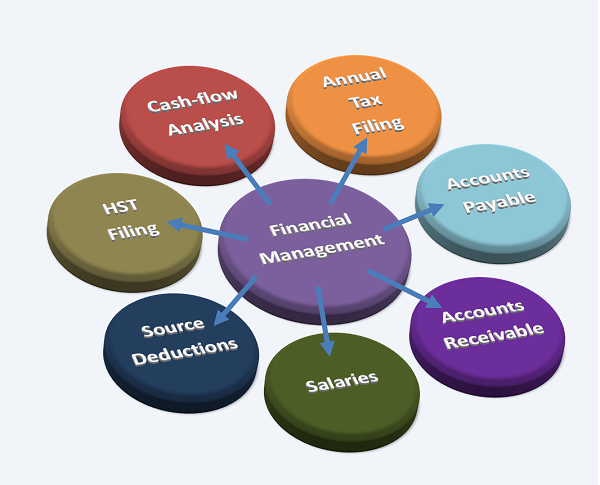Business Finance
If an individual or a firm may require to obtain finance to start or expand the business. Finance has to be chosen carefully as it may affect tax obligations and cash flow.
Before deciding the source finance the following points should be considered.
- Calculate how much finance and what type of finance is required
- A business plan
- The timeframe one may need to repay the loan
- Determine the ability to repay the loan
It is necessary to seek a piece of professional advice from an accountant or a business advisor to make sound financial decisions.
Types of finance:
There are to the main type of finance:
- Debt finance
- Equity finance
Debt Finance – Money that is borrowed from an external lender fro example bank or financial institute is known as Debt Finance.
Advantages of Debt Finance
- One has complete control of the business.
- Interest on this loan amount is tax-deductible
- The term may be long or short as per borrower
Disadvantages of Debt Finance
- The repayment time period is fixed.
- Loan repayment is commenced as soon as the loan is approved
- The loan is secured against assets of the business or the owner’s property.
- Due to the repayment of the loan, the cash may drain and it could be difficult to grow the business.
Equity finance – Investing your own money or taking funds from the stakeholder’s partial ownership to them in exchange known as Equity Finance.
Advantages of Equity Finance
- The loan which is an investment is not to be paid immediately to the risk is lesser.
- There is no repayment of the loan so one may have more cash in hand as profit remains in the hand.
- Additional creditability and skillsets in a business can be provided by the investor(s).
Disadvantages of Equity Finance
- One has to share ownership and control of the business and also be a part of the business decisions.
- It takes lots of effort to find the right investor for your business.
Your relationship with the lender should be overviewed on a regular basis to ensure that you are getting the best of the financial terms.
Source of Finance-
Dept Finance Sources –
- Financial Institutions-
Finance can be provided as loans, overdrafts or lines of credit through banks, credit unions, and building societies, etc.
- Retailers –
Purchase of goods required for business through store credit via a finance company. Store cards may have high-interest rates but some retailers may also offer an interest-free period for the same.
- Finance Companies –
Finance companies should be registered with the Australian Securities and Investments Commission (ASIC). Most of the finance companies offer a financial product b\via retailer.
- Suppliers –
Delay in payment of goods is allowed in trade credit.
- Factor Companies –
Factor Companies also referred to as debtors finance. When a business sells its account receivable i.e invoices to a third party (called a factor) to receive cash without waiting 30 to 60 days from a customer is called Factoring. The invoice payment is paid by the customers directly to the factoring company. The cost may vary from company to company to provide this service. Complete research should be done before entering into any agreement with these companies.
- Invoice Finance –
Invoice finance is the same as factor finance but here the invoices are paid to the business and customers are not aware of the invoice financer and the agreement.
- Peer-to-peer Lenders –
Peer-to-peer lenders match the people who are interested to invest their money with the people who are looking for finance. The time period of loan may be locked and the interest rates may also vary according to the level of risk.
- Family & Friends –
Friends and family may offer money as a loan. To avoid misunderstandings between you, it is important to have a written agreement signed with specified terms of loan like repayment of loan amount and interest and terms of interest. It is advisable to seek legal advice for a loan agreement.
Equity Finance Sources –
- Personal Finances –
Funding own business from personal savings or sales of personal assets is called personal Finance.
- Venture Capitalists –
The professional investors who invest a large number of funds into business as equity with the potential for high growth and profit.
- Family or Friends –
Family members or friends may provide funds in return of share in the business or may also become a partner. This option has to be carefully be considered as business relationships may also affect personal relationships.
- Private Investors –
Business Angels is another name for Private investors, these investors are generally wealthy individuals who invest a huge amount of money in return for equity and share in the profit of a business.
- Crowd Funding –
Collect the effort of a large pool of individuals for raising capital primarily online via social media or other crowdfunding platforms is called Crowdfunding. A large sum of money is invested by the investors in exchange for equity, or small amounts are invested in return of the first-run product or other rewards.
- Crowd-Source Equity Funding –
Crowd-Source Equity Funding is a source for star-ups and small businesses to raise finance from the public. Normally a small amount is raised from a large number of investors. An investment of a maximum of $10,000 a year can be invested in a business in this funding by an investor in exchange for shares.
- Government –
The government services are mostly free or low-cost advisory services, information or guidance. The eligibility for a grant is in certain circumstances like business expansion, research, and development, innovation or exporting.



























































